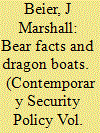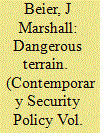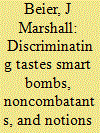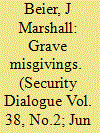|
|
|
Sort Order |
|
|
|
Items / Page
|
|
|
|
|
|
|
| Srl | Item |
| 1 |
ID:
064680


|
|
|
| 2 |
ID:
072791


|
|
|
|
|
| Publication |
2005.
|
| Summary/Abstract |
In February 2005 Canadian Prime Minister Paul Martin announced that his government would not partner with the United States on continental missile defence, confounding growing anticipation of imminent Canadian involvement. Predicated on the dominance of economic concerns underscored by a general sense of deteriorating Canada-American relations, these erstwhile expectations discounted the weight of a popular outlook influenced by deeply held identity commitments, something the minority Martin government could ill afford to do. Analysis of identity as a key determinant of Canadian policy in this instance is revealing not only of the sources of the decision taken on missile defence, but also of the centrality of identity performance to Canada's ability to successfully enact its international diplomacies. On these terms, it also finds non-participation in continental missile defence to be well recommended by broader Canadian interests.
|
|
|
|
|
|
|
|
|
|
|
|
|
|
|
|
| 3 |
ID:
105003


|
|
|
|
|
| Publication |
2011.
|
| Summary/Abstract |
The bases of legitimacy in recourse to war have, in recent years, come to turn vitally on meaningful discrimination between combatants and noncombatants. Concurrently, the remarkable successes of the movement to ban antipersonnel landmines and the follow-on ban on cluster munitions have likewise been predicated on this same arbiter of legitimacy, marking specific kinds of weapons as bad for their inherent indiscriminacy. This article begins by exploring sources of popular expectations that make official claims to discriminacy seem plausible. In particular, the role of popular representation is considered for its foregrounding of the technological feats of precision-guided munitions in ways that mystify ethico-political questions about their use. It is argued that this, more than any objective properties of weapons themselves, has been the truly revolutionary aspect of the so-called Revolution in Military Affairs (RMA). The implications of/in this for/by disarmament advocacy of the sort exemplified in the civil society campaign to ban landmines are weighed.
|
|
|
|
|
|
|
|
|
|
|
|
|
|
|
|
| 4 |
ID:
057349


|
|
|
| 5 |
ID:
077355


|
|
|
|
|
| Publication |
2007.
|
| Summary/Abstract |
Days after the December 1890 US Army massacre of Lakota refugees at Wounded Knee, South Dakota, commercial photographer George Trager photographed the Army burial detail as they cleared the site and committed the dead to a mass grave. Widely circulated as post-cards, Trager's photographs merged with a broader colonial narrative, allegorically and cathartically sketching a heroic account of a dire confrontation between `civilization' and `savagery'. Reconfirming dominant ideas about an inherently dangerous foe, the Wounded Knee photos worked through colonial imaginaries in ways that reinforced a Euro-American monopoly on legitimacy in war. More recently, widely circulated photos of abuse of prisoners by US soldiers at Baghdad's Abu Ghraib Prison have effected a disruption of the operant war narrative. Whereas Trager's photographs worked to sustain stable definitions of moral `civilization' and `savage' depravity, those from Abu Ghraib have undermined the legitimacy of US conduct in Iraq. In this article, I consider these differing effects with reference to photographic composition and the popular functions of allegory and catharsis
|
|
|
|
|
|
|
|
|
|
|
|
|
|
|
|
| 6 |
ID:
064956


|
|
|
|
|
| Publication |
Hampshire, Palgrave Macmillan, 2005.
|
| Description |
252p.
|
| Standard Number |
1403969027
|
|
|
|
|
|
|
|
|
|
|
|
Copies: C:1/I:0,R:0,Q:0
Circulation
| Accession# | Call# | Current Location | Status | Policy | Location |
| 049929 | 323.1197/BEI 049929 | Main | On Shelf | General | |
|
|
|
|
| 7 |
ID:
134382


|
|
|
|
|
| Summary/Abstract |
Beginning with a recurrent discussion about the choice between two imagined Star Trek technologies, the holodeck and the transporter, this article explores how popular culture can be revealing of ways in which political possibilities are variously made and foreclosed by dint of deeply held but underinterrogated ideational commitments circulating in the mundane and carried forward by what might seem unlikely voices. Tracing a few such commitments as they pertain to the legitimation and delegitimation of political subjecthood, we examine the political stakes of questions of agency and delusion through what were initially reported to have been the June 2006 suicides of three detainees at the US base at Guantanamo Bay, Cuba, and the crisis that emerged with respect to multiple hunger strikes at that same facility some seven years later. Through these we ask whether there might be resistance-enabling possibilities as yet unimagined in agential choices that can so deeply offend prevailing sensibilities that it is sometimes difficult to abide them as valid choices at all. As we struggle with these resurgent security politics, it might seem frivolous to turn to film and television, or pub games at conferences, for guidance. What this article demonstrates is that these popular renderings of the limits of acceptable subjectivity draw on deep currents in our very broadest culture. In a very real sense, we are all very well prepared for our present political rendition.
|
|
|
|
|
|
|
|
|
|
|
|
|
|
|
|
| 8 |
ID:
185244


|
|
|
|
|
| Summary/Abstract |
Avoidance of civilian casualties increasingly affects the political calculus of legitimacy in armed conflict. “Collateral damage” is a problem that can be managed through the material production of precision, but it is also the case that precision is a problem managed through the cultural production of collateral damage. Bearing decisively on popular perceptions of ethical conduct in recourse to political violence, childhood is an important site of meaning-making in this process. In pop culture, news dispatches, and social media, children, as quintessential innocents, figure prominently where the dire human consequences of imprecision are depicted. Children thus affect the practical “precision” of even the most advanced weapons, perhaps precluding a strike for their presence, potentially coloring it with their corpses. But who count as children, how, when, where, and why are not at all settled questions. Drawing insights from what the 2015 film, Eye in the Sky, reveals about a key social technology of governance we have already internalized, I explore how childhood is itself a terrain of engagement in the (un)making of precision.
|
|
|
|
|
|
|
|
|
|
|
|
|
|
|
|
|
|
|
|
|